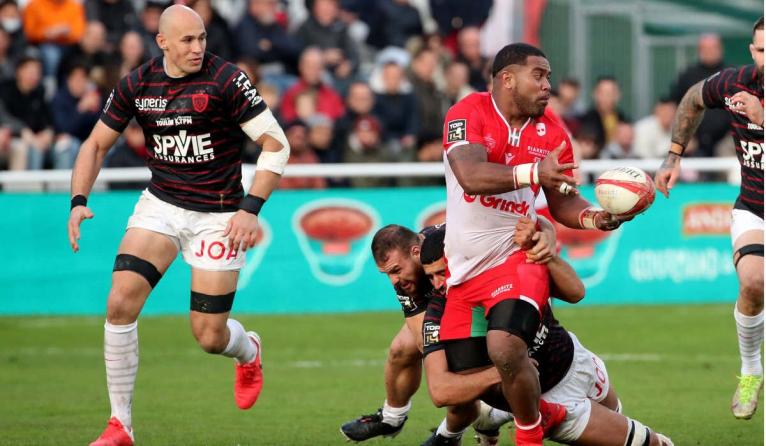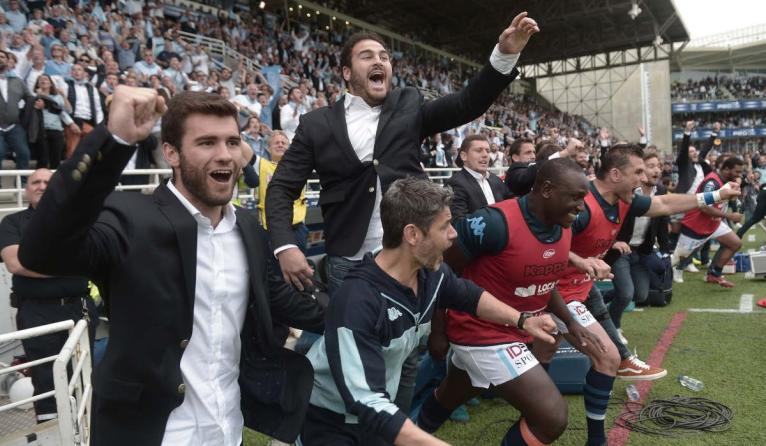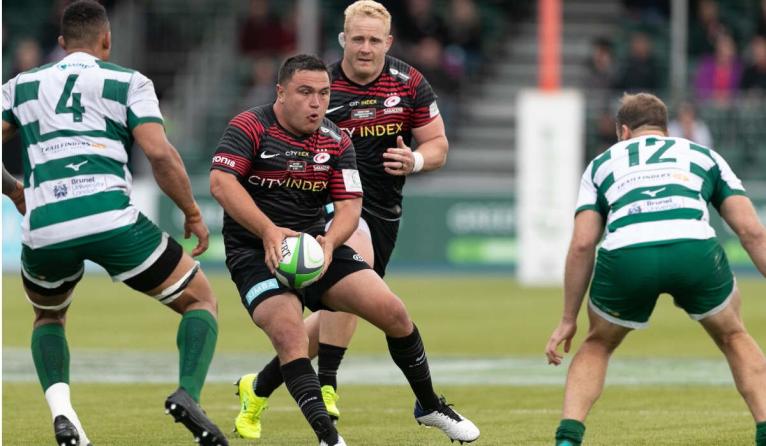The Gallagher Premiership featured in Monday’s editorial in Midi Olympique and not in a good way. France’s rugby newspaper highlighted the plight of Bath, thrashed 64-0 by Gloucester last weekend, as a warning for their domestic game. The reaction in England to Bath’s historic defeat was ‘general indifference’, commented Midi Olympique, which was hardly a surprise for ‘when there is nothing to play for, there is nothing to celebrate and nothing to cry for’.
The paper’s point was that ringfencing the Premiership, as the RFU has effectively done in denying Ealing Trailfinders promotion from the Championship because of inadequate facilities, was not a wise move. Far better to have relegation and promotion between the top two divisions, even if it means heartbreak for some famous old clubs.
On the same day that Bath were being annihilated, something similar was happening to Biarritz, humbled 48-13 at home to Castres. That defeat, their 19th of the season, consigned them to the ProD2 next season, less than 12 months after they had returned to the Top14 after an absence of seven years.
C’est la vie was the gist of the Midi Olympique editorial. Biarritz had not been good enough, although the paper commended them for their handful of victories, including memorable triumphs against La Rochelle, Bordeaux and Racing 92.

Biarritz could soon be joined in the ProD2 next season by Perpignan, who, like them, were promoted last year. The Catalan club are 13th and if they lose their penultimate match away at Castres and Brive, who are 12th, win at home to Toulouse then their stay in the top flight will have been as brief as Biarritz’s.
There are a growing number of people in France who are concerned at the widening gap between the ProD2 and the Top 14, and they have statistics on their side. Since the inauguration of the Top14 in 2005, 50 per cent of clubs promoted from the ProD2 have been relegated the following season. In that period there have been only two seasons when the promoted clubs have both avoided relegation a year later: in 2006-07 and in 2013-14.
What the clubs fear most is creating the type of chasm that exists over La Manche in England, where the Championship appears close to being cut adrift. In the D2, the average attendance pre-pandemic was 5,200, whereas in the Championship, it was a paltry 1,600 and the numbers are contracting monthly. Likewise, when it comes to funding, the D2 is keeping afloat; the LNR split the TV money 60/40 between the T14 and ProD2 and only last year the LNR signed a new deal with Canal for 2023-2027 which works out at 113.7m euros per season. If this writer’s O-Level maths serves him correctly this is approximately 2.8m euros per season for each of the 16 ProD2 clubs. Compare that to the 288k funding the Championship clubs were left to pick over in 2020 when the RFU cut their funding and you can see the disparity.
However many advantages the ProD2 has over their counterparts in England, the odds are still stacked against them staying up.
However many advantages the ProD2 has over their counterparts in England, the odds are still stacked against them staying up. Even if a newly-promoted club does avoid a swift return to the ProD2 the best they can hope for is lower-table survival; only Racing 92, in 2009-10, finished in the top six in their first season in the Top14.
Last week a panel of ex-players and journalists discussed this widening gap and the former Biarritz and France No 8 Imanol Harinordoquy blamed the situation on the structure of the ProD2 season, calling it ‘incomprehensible’. He was referring in particular to the play-off system that was introduced for the 2017-18 season. Previously the club that finished top of the ProD2 was automatically promoted to the Top 14, but the change saw the top club winning contesting a six-team play-off; the clubs that finish first and second in the ProD2 receive a bye into the semi-finals, where they play the winners of the quarter-finals between the clubs that finished third to sixth in the league table.

As the president of the LNR, René Bouscatel, said recently, this play-off system ‘contributes to the ProD2 in terms of intensity and visibility not to mention the TV rights’. According to Midi Olympique, the majority of ProD2 clubs are in favour of the current play-off season because they get a slice of the TV rights pie.
But Harinordoquy is not alone in calling for a return to the days when the club that finished top at the end of the regular season was automatically promoted. ‘Automatic promotion seems to me indispensable in order to be able to work on the future and invest financially and structurally in the club,’ explained Philippe Tayeb, president of Bayonne, who are currently second in the ProD2.
The only club in recent seasons who have established themselves as a serious force in the Top 14 after winning promotion are Lyon. They ran away with the ProD2 title in 2015-16, before the play-off system was introduced, and therefore because they knew they were guaranteed promotion at the end of March they had months in which to prepare for the challenge of the Top14. Not only was this essential for attracting commercial partners but also high-profile players; among Lyon’s recruits that summer were former England full-back Delon Armitage, Pumas’ prop Francisco Kodela, Wallaby scrum-half Mike Harris and Frederick Michalak, one of the most talented and popular French players of his generation.
Unless a newly-promoted club attracts a millionaire owner, ready to spend a vast amount on signing new players at short notice, then instant relegation is unavoidable
Jean-Baptiste Aldigé, president of Biarritz
Nevertheless, Lyon struggled to adjust in their first season in Top 14, finishing 10th, and it was only in 2017-18 that they began to look like a top-flight team, qualifying for the play-offs and also for the 2018-19 Champions Cup.
The new play-off system puts the two promoted ProD2 clubs at an immense disadvantage; last season for example, Perpignan qualified for the Top 14 on June 5, beating Biarritz in the play-off final. A week later Biarritz defeated Bayonne, who finished 13th in the Top 14 (the club that finishes last is automatically relegated). The 2021-22 season started on September 5, leaving Biarritz less than two months to prepare.
‘We send the ProD2 clubs to the butchers,’ said Jean-Baptiste Aldigé, president of Biarritz, in an interview with Midi Olympique this week. In his view unless a newly-promoted club attracts a millionaire owner, ready to spend a vast amount on signing new players at short notice, then instant relegation is unavoidable.

The LNR claim they are doing their best to assist the promoted clubs: for example, this summer they have until July 10 to sign new players, set against June 30 for the existing Top 14 clubs. In reality that extra fortnight will make little difference as most of the top talent will have already been snapped up.
The LNR also relax the regulations on the number of France-qualified players (JIFFs) in the matchday squads of newly-promoted clubs; this season 16 was the required number in each matchday squad for the Top 14, although the figure was 14 for Biarritz and Perpignan, the reasoning being that this would allow them to sign overseas players at late notice.
These are all ineffectual gestures, in the opinion of Aldigé, who believes that only a return to the old system of automatic qualification for the top two clubs will allow newly-promoted clubs to make a fist of the Top14.
Rugby is about the results on the pitch and if they don’t bring their just reward then what is the point of competing?
Mont-de-Marsan are currently top of the ProD2, eight points clear of Bayonne, and looking a good bet for promotion. And even safer gamble is that should they ascend to the Top 14 they will be straight back down again. Mont-de-Marsan’s last season in the top flight was in 2012-13 when they won just two of their 26 matches. Their problem is their location, slap bang in the middle of the heartland of French rugby: Toulouse to the east, Pau to the south, Bordeaux to the north and Bayonne and Biarritz to the west. How can they hope to seal lucrative commercial deals in such a crowded market, particularly in the current economic climate.
But should Mont-de-Marsan be prevented from taking their place in the Top 14 because of their scant financial resources? Like the players and coaches at Ealing Trailfinders, Mont-de-Marsan have busted a gut this season in the pursuit of promotion. Their facilities may not be the greatest, nor their name the most glamorous, but rugby is about the results on the pitch and if they don’t bring their just reward then what is the point of competing?


Excellent article, GM always improved my knowledge of French rugby!